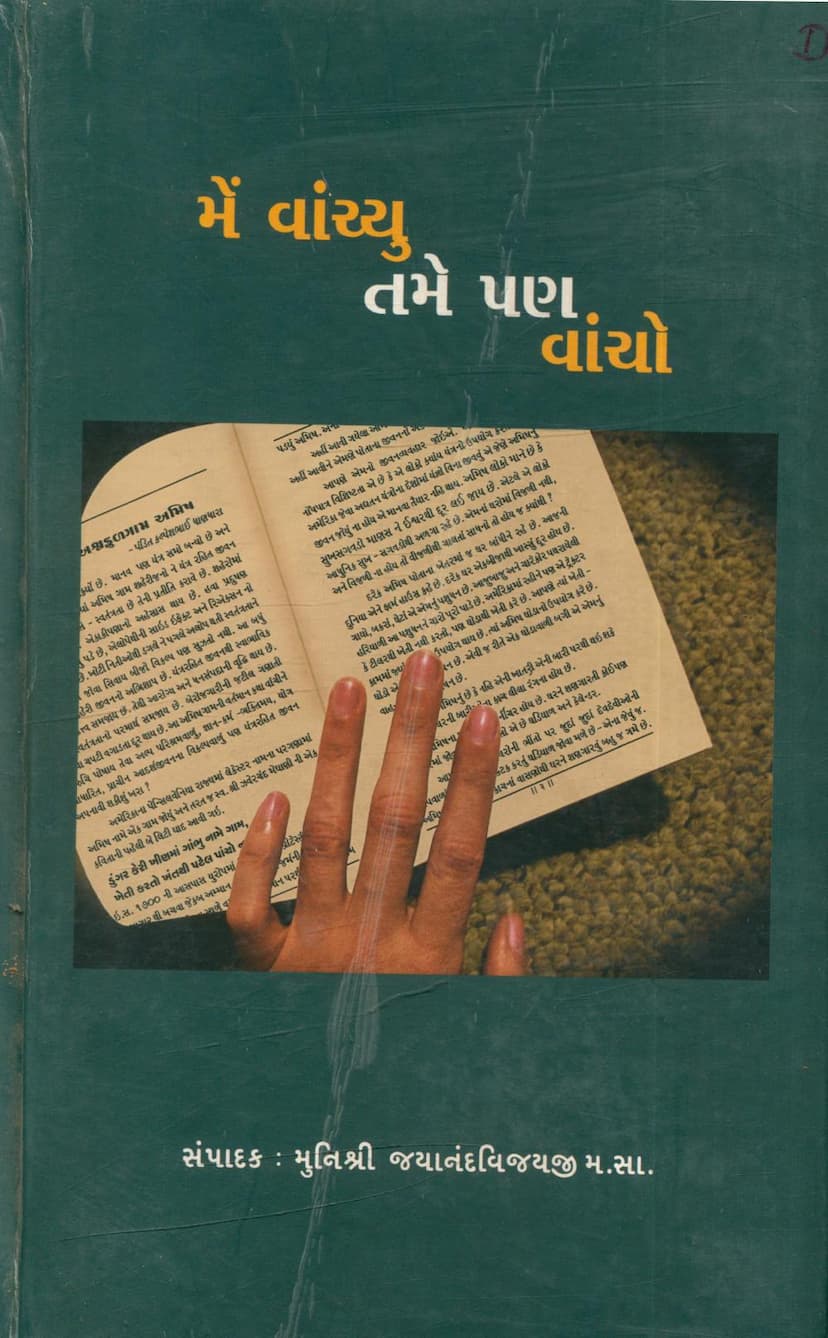Me Vanchyu Tame Pan Vancho
Added to library: September 2, 2025

Summary
This document is a collection of articles, reflections, and advice related to Jain philosophy, ethics, and societal practices, compiled by Jayanandvijay. The title, "Me Vanchyu Tame Pan Vanco" (I read, you also read), suggests a call to engage with and learn from the presented content.
Here's a breakdown of the key themes and content based on the provided pages:
Core Themes and Content:
- Critique of Modern Society and Technology: The text frequently contrasts traditional values and practices with the perceived negative impacts of modern lifestyles, particularly regarding materialism, technology (TV, mobile phones, internet), and Westernization. There's a strong emphasis on simple living, self-sufficiency, and avoiding excessive consumption.
- Emphasis on Jain Principles: Jain principles of ahimsa (non-violence), aparigraha (non-possession), brahmacharya (celibacy/right conduct), anekantavada (multi-sidedness), and ethical conduct are woven throughout many articles. The text often highlights how these principles offer solutions to modern problems.
- Critique of Modern Education: Several articles question the effectiveness and direction of current educational systems, arguing that they focus too much on rote learning and career preparation rather than character development and true knowledge. The loss of traditional Indian values in education is a recurring concern.
- The Role of Women and Family: The text delves into the importance of women's roles in family and society, contrasting traditional ideals with modern trends. It emphasizes the significance of a woman's virtue, her role as a mother, and the need for moral upbringing of children. There's a critique of Western influence leading to perceived decline in these values.
- Health and Well-being: An extensive section discusses health, emphasizing the importance of diet, proper digestion, natural remedies, and avoiding harmful substances. There's a strong stance against modern medicine's side effects and a promotion of natural, holistic approaches.
- Social Issues and Ethical Dilemmas: The document touches upon various social issues like unemployment, the plight of sanitation workers, consumerism, the misuse of media, and even controversial topics like abortion. It often presents a critical perspective, urging readers to consider the underlying causes and ethical implications.
- The "Amish" Community: The article on "Amish" villages in America serves as a prime example of a community living without modern technology, emphasizing the peace, freedom, and natural living that results from such a lifestyle. This is used as a model for re-evaluating our own choices.
- The Importance of "Saathiyo" (Symbolic Representation): An article explains the meaning and significance of "Saathiyo," connecting it to key Jain concepts and life principles.
- Critique of Corruption and Greed: The text condemns the pervasive corruption in society, particularly within religious institutions and governance, highlighting how the pursuit of wealth and power can undermine ethical and spiritual values.
- The Need for Self-Improvement and Discipline: Many articles stress the importance of personal effort, discipline, continuous learning, and the pursuit of true knowledge over superficial achievements.
- Financial Prudence and Avoiding Waste: The text encourages responsible use of resources, particularly water, and critiques the wasteful habits prevalent in modern society.
- The Dangers of Mimicry and Blind Following: The book cautions against blindly imitating Western lifestyles and trends without considering their suitability and potential negative consequences for Indian culture and values.
Overall Tone and Purpose:
The overarching tone is one of introspection, moral reflection, and a call to return to foundational values. The author(s) appear to be advocating for a return to a simpler, more ethical, and spiritually grounded way of life, aligning with Jain principles. The articles often present a critical view of societal changes and urge readers to be mindful of their actions and their impact on themselves, their families, society, and the environment.
The compilation aims to educate and inspire readers to re-examine their own lives, choices, and adherence to traditional wisdom, particularly within the Jain context, while also engaging with broader societal and ethical concerns.